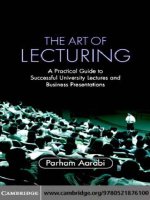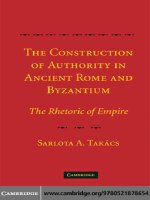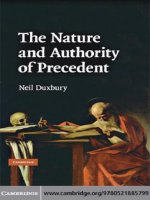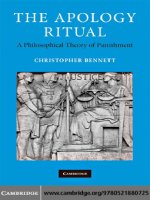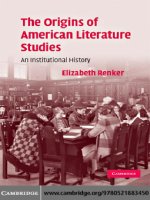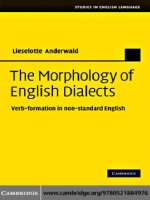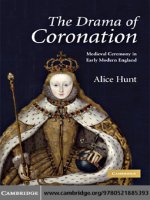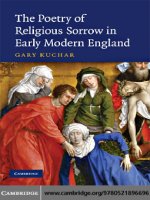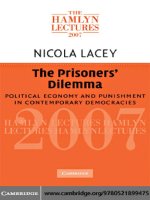0521803500 cambridge university press the political thought of king alfred the great jun 2007
Bạn đang xem bản rút gọn của tài liệu. Xem và tải ngay bản đầy đủ của tài liệu tại đây (3.97 MB, 437 trang )
This page intentionally left blank
THE POLITICAL THOUGHT OF
KING ALFRED THE GREAT
This book is a comprehensive study of political thought at the court of
King Alfred the Great (871–99). It explains the extraordinary burst of
royal learned activity focused on inventive translations from Latin into
Old English attributed to Alfred’s own authorship. A full exploration of
context establishes these texts as part of a single discourse which placed
Alfred himself at the heart of all rightful power and authority. A major
theme is the relevance of Frankish and other European experiences, as
sources of expertise and shared concerns, and for important contrasts
with Alfredian thought and behaviour. Part I assesses Alfred’s rule against
West Saxon structures, showing the centrality of the royal household in
the operation of power. Part II offers an intimate analysis of the royal
texts, developing far-reaching implications for Alfredian kingship,
communication and court culture. Comparative in approach, the book
places Alfred’s reign at the forefront of wider European trends in
aristocratic life.
david pratt is Fellow and Director of Studies in History, Downing
College, Cambridge.
Cambridge Studies in Medieval Life and Thought
Fourth Series
General Editor:
rosamond mckitterick
Professor of Medieval History, University of Cambridge, and Fellow of Sidney Sussex College
Advisory Editors:
christine carpenter
Professor of Medieval English History, University of Cambridge, and Fellow of New Hall
jonathan shepard
The series Cambridge Studies in Medieval Life and Thought was inaugurated
by G. G. Coulton in 1921; Professor Rosamond McKitterick now acts as
General Editor of the Fourth Series, with Professor Christine Carpenter and
Dr Jonathan Shepard as Advisory Editors. The series brings together
outstanding work by medieval scholars over a wide range of human endeavour
extending from political economy to the history of ideas.
For a list of titles in the series, see end of book.
THE POLITICAL THOUGHT OF
KING ALFRED THE GREAT
DAVID PRATT
CAMBRIDGE UNIVERSITY PRESS
Cambridge, New York, Melbourne, Madrid, Cape Town, Singapore, São Paulo
Cambridge University Press
The Edinburgh Building, Cambridge CB2 8RU, UK
Published in the United States of America by Cambridge University Press, New York
www.cambridge.org
Information on this title: www.cambridge.org/9780521803502
© David Pratt 2007
This publication is in copyright. Subject to statutory exception and to the provision of
relevant collective licensing agreements, no reproduction of any part may take place
without the written permission of Cambridge University Press.
First published in print format 2007
eBook (EBL)
ISBN-13 978-0-511-28920-0
ISBN-10 0-511-28920-0
eBook (EBL)
ISBN-13
ISBN-10
hardback
978-0-521-80350-2
hardback
0-521-80350-0
Cambridge University Press has no responsibility for the persistence or accuracy of urls
for external or third-party internet websites referred to in this publication, and does not
guarantee that any content on such websites is, or will remain, accurate or appropriate.
CONTENTS
Acknowledgements
List of abbreviations
Note on citations
viii
xi
xv
1 introduction
1
Part I: The West Saxon Political Order
2 resources and extraction
West Saxon resources and royal power
Military service and the common burdens
3 royal lordship and secular office-holding
The king’s thegns
The royal household
Gifts and gift-giving
4 royal lordship and ecclesiastical office-holding
A new accommodation: royal monasteries and the council of
Kingston (838)
The Southumbrian episcopate and the state of ecclesiastical discipline
Bishops as ‘the best king’s thegns’
Royal priests in the royal household
Frankish ecclesiastical conditions and Carolingian kingship
5 the articulation of power under king alfred’s
predecessors
Collective office-holding: West Saxon royal devotion
Royal office-holding: the First English Coronation Order
The uses of literacy?
Sources of textual culture (1) ecclesiastical communities
Sources of textual culture (2) the West Saxon royal household
6 the impact of the vikings
Logistics of defence
v
15
17
17
22
28
29
34
38
44
45
48
52
54
58
63
63
72
78
82
86
93
94
Contents
Lordship and manpower
Land and landholding
Royal income and urban development
Collective security (1) ‘king of the Anglo-Saxons’
Collective security (2) ‘ruler of all the Christians of the
island of Britain’
Part II: Alfredian Discourse and its Efficacy
7
the field of alfredian knowledge
Alfredian innovation: Alfredian wisdom and the shift to
vernacular prose
Intended audiences and the shift to vernacular literacy
Textual dissemination and the field of Alfredian knowledge
8
the construction of alfredian discourse
‘Royal’ production: Alfredian discourse and its distinctiveness
Languages of office-holding (1) Gregorian language
Languages of office-holding (2) Solomon’s dream
The implications of Alfredian discourse
9
alfredian technology: books and ædificia
Books and book production
Candle-lantern, Fuller brooch and ‘æstels’
10 the hierdeboc as a treatise of power
Language and contexts
The origin and purpose of power
The active and contemplative lives
The Hierdeboc and the Southumbrian episcopate
11 the domboc as a reorientation of royal law
Written law: authority and status
The construction of Alfredian judgement
The historical projection of secular law
The defence of lordship
The Domboc in practice
12 tribulation and triumph in the first
fifty psalms
Psalmody and royal devotion
Apparatus and voice
God, rihtwisnes and sinful enemies
Hardships and divine justice
Alfred’s Psalms and Alfredian theatre
13 the search for a satisfactory consolation
The Consolatio philosophiae in context
Royal translation and Carolingian expertise
vi
97
99
102
105
107
113
115
115
120
126
130
130
134
151
166
179
179
185
193
194
196
204
209
214
214
218
222
232
238
242
242
245
252
256
261
264
265
270
Contents
Alfredian adaptation: ‘Mind’, wisdom and ‘worldly blessings’
Cræft, tools and resources
Wyrd and divine justice
The Froferboc and Alfredian theatre
14 seeing god as he is
The Soliloquia in context
Royal translation and Carolingian expertise
Alfredian adaptation: wisdom and the sight of God
Lordship and authority
Alfred’s Soliloquies and Alfredian theatre
15 conclusion
Appendix: West Frankish deployment of Solomon’s dream
Bibliography
Index of manuscripts
General index
vii
280
287
295
302
308
309
312
317
327
332
338
351
357
395
397
ACKNOWLEDGEMENTS
My research interest in King Alfred actually extends back to a dissertation
written in the final year of my undergraduate degree. This book is a
revised and extended version of my subsequent doctoral thesis, submitted
in 1999. I have incurred many debts of gratitude on the long road to this
completed volume. The first is due to Rosamond McKitterick, who as
my supervisor and latterly as editor has been an unfailing source of
wisdom and support. I must also express my profound thanks to Simon
Keynes, whose stimulating advice has encouraged my research at every
stage of its progress. My PhD examiners, Nicholas Brooks and Janet
Nelson, offered guidance and criticism which proved invaluable in the
transition to publication. Quite widely disseminated to Alfredian scholars
and others, my thesis received further helpful comments from Janet
Bately, Christine Carpenter, Malcolm Godden, David Luscombe, Bruce
O’Brien, Carolin Schreiber and Patrick Wormald. For advice on metalwork, I am very grateful to Leslie Webster; other important assistance
was supplied by Sean Miller and Petrus Tax. Simon Whitmore, Clare
Orchard and the staff at Cambridge University Press have been tireless in
their efficiency. Thanks for financial support are due to the managers of
the Robert Owen Bishop Scholarship at Christ’s College, Cambridge; to
the British Academy, an award from whom supported my doctoral
research; and to Emmanuel College, Cambridge, where I spent three
fruitful years as a Research Fellow. Since 2001 I have been employed by
the Master and Fellows of Downing College, in whose company it has
been a privilege to live, teach and research. Especial thanks are due to my
colleagues Paul Millett and Richard Smith, and to the cohorts of
undergraduate historians who may recognize themes pursued in College
teaching. I owe many lasting debts to friends who have enriched my life in
Cambridge over the past decade. Of these, Christina Po¨ssel, Carl Watkins
viii
Acknowledgements
and Mike Woodrow all directly aided my passage to completion. Finally,
I record the deep and continuous debt that I owe to my parents and
family, who have borne the effects of this project with great patience; it is
to them, collectively, that this book is dedicated.
ix
ABBREVIATIONS
AB
AC
Af
AGu
ASC
ASE
ASPR
ASSAH
BAR
BCS (with
number of
document)
Bo
C&S
CCCM
CCSL
Cons. phil.
Annales de Saint-Bertin, ed. F. Grat, et al. (Paris, 1964)
Annales Cambriae, ed. J. Williams, ab Ithel (London, 1860)
Laws of Alfred, ed. F. Liebermann, Die Gesetze der
Angelsachsen, 3 vols. (Halle, 1903–16) I, 16–88
Alfred-Guthrum treaty, ed. Liebermann, Gesetze I,
126–9
Anglo-Saxon Chronicle (manuscript A unless otherwise
stated), cited from the edition of C. Plummer, Two of
the Saxon Chronicles Parallel, 2 vols. (Oxford, 1892–9),
but according to the corrected chronology in The
Anglo-Saxon Chronicle: a Revised Translation, trans.
D. Whitelock, with D. C. Douglas and S. I. Tucker
(London, 1961)
Anglo-Saxon England
The Anglo-Saxon Poetic Records, ed. G. P. Krapp and
E. van K. Dobbie, 6 vols. (New York, 1931–42)
Anglo-Saxon Studies in Archaeology and History
British Archaelogical Reports
W. de G. Birch, Cartularium Saxonicum, 3 vols. (London,
1885–93)
King Alfred’s Old English Version of Boethius: De Consolatione Philosophiae, ed. W. J. Sedgefield (Oxford, 1900)
Councils and Synods with other Documents relating to the
English Church I, ed. D. Whitelock, M. Brett and C. N. L.
Brooke, 2 vols. (Oxford, 1981)
Corpus Christianorum, Continuatio Mediaevalis
Corpus Christianorum, Series Latina
Anicii Manlii Severini Boethii Philosophiae Consolatio, ed.
L. Bieler, CCSL 94, 2nd edn (Turnhout, 1984)
xi
List of abbreviations
CP
King Alfred’s West Saxon Version of Gregory’s Pastoral
Care, EETS, os 45 and 50 (London, 1871), cited from
manuscripts Ci and Cii, where text is available
CSEL
Corpus Scriptorum Ecclesiasticorum Latinorum
DIL
Jonas of Orle´ans, De institutione laicali, PL 106: 121–278
DIR
Jonas d’Orle´ans: Le Me´tier de Roi (De institutione regia),
ed. A. Dubreucq, SC 407 (Paris, 1995)
EcHR
Economic History Review
EEMF
Early English Manuscripts in Facsimile
EETS
Early English Text Society
–, os
–, original series
–, ss
–, supplementary series
EHD
English Historical Documents, c. 500–1042, ed. D. Whitelock,
English Historical Documents I, 2nd edn (London,
1979)
EHR
English Historical Review
EME
Early Medieval Europe
¨ bersetzung der Dialoge
GD
Bischof Wærferths von Worcester U
Gregors des Grossen, ed. H. Hecht, 2 vols. (Leipzig,
1900–7)
Gneuss,
H. Gneuss, Handlist of Anglo-Saxon Manuscripts: a List of
Handlist
Manuscripts and Manuscript Fragments Written or Owned
in England up to 1100 (Tempe, AZ, 2001)
Golden Age
The Golden Age of Anglo-Saxon Art 966–1066, ed.
J. Backhouse, D. H. Turner and L. Webster (London,
1984)
GR
William of Malmesbury, Gesta Regum Anglorum, ed.
R. A. B. Mynors, R. M. Thomson and M. Winterbottom,
2 vols. (Oxford, 1998–9)
HE
Bede, Historia ecclesiastica gentis Anglorum, ed. C. Plummer,
Venerabilis Baedae Opera Historica, 2 vols. (Oxford, 1896)
JEH
Journal of Ecclesiastical History
JTS
Journal of Theological Studies
K&L, Alfred
S. Keynes and M. Lapidge, Alfred the Great: Asser’s Life of
King Alfred and other Contemporary Sources (Harmondsworth, 1983)
Ker, Catalogue N. R. Ker, Catalogue of Manuscripts Containing AngloSaxon, Reissue with Supplement (Oxford, 1990)
Lapidge,
M. Lapidge, Anglo-Latin Literature 600–899 (London,
ALL I
1996)
xii
List of abbreviations
Lapidge,
ALL II
Liebermann,
Gesetze
Making of
England
MGH
–, Capit.
–, Conc.
–, Epist.
–, Leges nat.
germ.
–, Poet.
–, SS
NCMH II
NCMH III
OE Bede
Or
P&P
PBA
PL
Ps.
Ps(P)
M. Lapidge, Anglo-Latin Literature 900–1066 (London,
1993)
F. Liebermann, Die Gesetze der Angelsachsen, 3 vols.
(Halle, 1903–16)
The Making of England: Anglo-Saxon Art and Culture AD
600–900, ed. L. Webster and J. Backhouse (London,
1991)
Monumenta Germaniae Historica
Capitularia. Legum Sectio II, Capitularia Regum Francorum, ed. A. Boretius and V. Krause, 2 vols. (Hanover,
1883–97)
Concilia. Legum Sectio III, Concilia II.i–ii, ed. A.
Werminghoff (Hanover, 1906–8), III–IV, ed. W.
Hartmann (Hanover, 1984–98)
Epistolae III–VIII (¼ Epistolae Merovingici et Karolini
Aevi I–VI) (Hanover, 1892–1939)
Leges Nationum Germanicarum, ed. K. Zeumer, K. A.
Eckhardt, et al., 6 vols. (Hanover, 1892–1969)
Poetae Latini Aevi Carolini, ed. E. Du¨mmler, L. Traube,
P. von Winterfeld and K. Strecker, 4 vols. (Hanover,
1881–99)
Scriptores in folio, 38 vols. (Hanover, 1871–)
R. McKitterick (ed.), The New Cambridge Medieval
History II c.700–c.900 (Cambridge, 1995)
T. Reuter (ed.), The New Cambridge Medieval History III
c.900–c.1024 (Cambridge, 1999)
The Old English Version of Bede’s Ecclesiastical History of
the English People, ed. T. Miller, EETS, os 95–6 and
110–11 (London, 1890–8)
The Old English Orosius, ed. J. M. Bately, EETS, ss 6
(London, New York and Toronto, 1980)
Past and Present
Proceedings of the British Academy
Patriologiae Cursus Completus. Series (Latina) Prima, ed.
J.-P. Migne, 221 vols. (Paris, 1844–64)
Le Psautier romain et les autres anciens psautiers latins, ed.
R. Weber, Collectanea Biblica Latina 10 (Vatican,
1953), for the Roman text; Biblia Sacra Iuxta Vulgatam
Versionem, ed. R. Weber, et al., 4th edn (Stuttgart,
1994), for variants from the Gallican Psalter
King Alfred’s Old English Prose Translation of the First
Fifty Psalms, ed. P. P. O’Neill (Cambridge, MA, 2001)
xiii
List of abbreviations
RC
Reg. past.
S (with
number
of document)
SC
SEHD
Settimane
Solil
Soliloquia
TRHS
VA
Wormald,
MEL I
Sedulius Scottus, Liber de rectoribus christianis, ed. S.
Hellmann, Sedulius Scottus, Quellen und Untersuchungen zur lateinischen Philologie des Mittelalters 1(1)
(Munich, 1906)
Gre´goire le Grand: Re`gle Pastorale, ed. F. Rommel, with
B. Judic and C. Morel, SC 381–2 (Paris, 1992)
P. H. Sawyer, Anglo-Saxon Charters: an Annotated List
and Bibliography (London, 1968), cited according to the
revised version by S. Kelly, available in electronic form
Sources chre´tiennes
Select English Historical Documents of the Ninth and Tenth
Centuries, ed. F. E. Harmer (Cambridge, 1914)
Settimane di studio del Centro italiano di studi sull’alto
medioevo (Spoleto)
King Alfred’s Version of St Augustine’s Soliloquies, ed.
T. A. Carnicelli (Cambridge, MA, 1969)
Augustine, Soliloquiorum libri duo, ed. W. Ho¨rmann,
CSEL 89 (Vienna, 1986), 3–98
Transactions of the Royal Historical Society
Asser’s Life of King Alfred, together with the Annals of St
Neots, erroneously ascribed to Asser, ed. W. H. Stevenson,
new imp. (Oxford, 1959), with corrections noted by
K&L, Alfred
P. Wormald, The Making of English Law: King Alfred to
the Twelfth Century. I: Legislation and its Limits (Oxford,
1999)
xiv
NOTE ON CITATIONS
References to Anglo-Saxon law-codes follow the edition and numbering system of Liebermann, Gesetze I; apart from Alfred’s laws, they are
identified by the ruler’s name in full. The Vulgate is cited from Biblia
Sacra Iuxta Vulgatam Versionem, ed. R. Weber et al., 4th edn (Stuttgart,
1994), with the exception of the Psalms, where I follow the text and
numbering system of the Roman Psalter. In supplying modern English
translations, I have prioritized sensitivity to original vocabulary and
syntax. Most translations are my own: for Alfredian sources, I have
borrowed where possible, and with adjustment, from K&L, Alfred, while
renderings of the Vulgate are modelled on the Douai-Rheims version.
In the dating of manuscripts, I have followed the convention of
supplying two superscript numbers where appropriate, to enable flexible
specification by either quarter- or half-century.
xv
Chapter 1
INTRODUCTION
Is there anything left to say about King Alfred? In part, the question is
misconstrued: every age has reinterpreted his ninth-century memory. In
his own lifetime Alfred’s rule was celebrated in vernacular history and
Latin biography; selectively revered in the later Anglo-Saxon period, his
reign was partly eclipsed by the reputations of Æthelstan and Edgar.1
Only in the later middle ages was Alfred singled out as a possible founder
of ‘English’ political and administrative unity. The momentous account
of Alfred’s viking warfare, and successful extension of West Saxon rule,
combined with a natural tendency to schematize jurisdictional uniformity. It was on this basis that Alfred was first styled ‘the Great’: for
Matthew Paris his reign had been pivotal in replacing a former ‘Heptarchy’ of seven kingdoms with rule over the whole of England. Only in
the sixteenth century did this vision accord with political needs for a
formative Alfredian past. In the learned recovery of several Alfredian
texts, Elizabethan antiquaries found deeper origins for a united English
church. Under Stuart and Hanoverian rule, those origins extended to
English ‘liberties’, conveniently undermining the alternative schema of a
‘Norman Yoke’. By the early eighteenth century, such interpretations
reached their climax in Alfred’s status as acknowledged ‘founder of the
English constitution’. The ‘Whig’ view in turn laid the basis for Victorian rituals of popular commemoration, enshrining Alfred as a symbol
of ancient freedom and nationhood.2
Modern reassessment has frequently wrestled with the baggage of
retrospection. Beyond later myth lies the reality of an abundant collection of contemporary sources, many variously associated with Alfred
1
2
S. Keynes, ‘The Cult of King Alfred the Great’, ASE 28 (1999), 225–356; B. Yorke, ‘Alfredism:
the Use and Abuse of Alfred’s Reputation in Later Centuries’, in Alfred the Great: Papers from the
Eleventh-Centenary Conferences, ed. T. Reuter (Aldershot, 2003), pp. 361–80.
P. Readman, ‘The Place of the Past in English Culture, c.1890–1914’, P&P 186 (February 2005),
147–99.
1
The political thought of King Alfred the Great
and his patronage. These include the principal narrative accounts in the
Anglo-Saxon Chronicle and the Latin Life of King Alfred by the king’s
Welsh assistant Asser; and, above all, a corpus of five vernacular texts
attributed to Alfred’s own authorship. As translations, often of considerable freedom, the latter rendered a distinctive selection of learned
Latin sources: the Regula pastoralis of Pope Gregory the Great; the
Consolatio philosophiae of the early sixth-century Roman aristocrat,
Boethius; the Soliloquia of St Augustine; the first fifty Psalms; and Mosaic
law in the introduction to Alfred’s law-book. ‘We hold that Alfred was a
great and glorious king in part because he tells us he was’, wrote Michael
Wallace-Hadrill in his seminal paper of 1949.3 What explained these
interests were Alfred’s debts to the legacy of Charlemagne, which he
now suspected ‘in almost every direction: military, liturgical, educational, literary, artistic’. Faced by viking invasion, Alfred had ‘turned for
help to the experts on kingship, Charlemagne’s descendants’: that
assistance had shaped his success.
Similar thinking reached its full potential in 1971 in the challenge of
R. H. C. Davis, ‘Alfred the Great: Propaganda and Truth’.4 Observing
that ‘almost all the sources [for Alfred’s reign] may have originated with
either Alfred himself or his immediate entourage’, Davis argued that ‘we
must somehow liberate ourselves from the Alfredian sources to see
Alfred as he really was’. Actually then depending on these sources, Davis
proceeded to isolate logistical difficulties faced by Alfred in defending his
kingdom from attack. What mattered to Alfred had been the exceptional
burdens placed on his subjects in the course of his military reforms,
especially the building of fortifications. This had relied on the wider
nobility, but the king ‘could not be sure of their strict obedience . . .
unless he could indoctrinate them with loyalty to himself and enthusiasm
for his cause’.5 This was why in Davis’ view the sources were so problematic, as ‘propaganda’ designed for this immediate purpose. For him
the Anglo-Saxon Chronicle had been the prime literary instrument, but by
implication, the same applied to all Alfredian image-making.
In the event, Davis had a mixed reception, his case partly circular in
equating learned self-record with concerted deception.6 In the Chronicle,
where Davis saw exaggeration of Alfred’s difficulties in the 870s, there
3
4
6
J. M. Wallace-Hadrill, ‘The Franks and the English in the Ninth Century: Some Common
Historical Interests’, History 35 (1950), 202–18, at 216–17, cf. 215 and 218; amended to ‘rightly
implies this’ in his Early Medieval History (Oxford, 1975), pp. 201–16, at 213.
5
History 56 (1971), 169–82, at 169 and 177–82.
Ibid., p. 182.
D. Whitelock, ‘The Importance of the Battle of Edington’, in her From Bede to Alfred: Studies in
Early Anglo-Saxon Literature and History (London, 1980), no. 13; S. Keynes, ‘A Tale of Two Kings:
Alfred the Great and Æthelred the Unready’, TRHS 5th series 36 (1986), 195–217, at 196–201.
2
Introduction
were stronger signs that even the severity of his predicament may have
been partly obscured.7 Yet in other ways his argument laid the basis for
all modern enquiry; together with that of Wallace-Hadrill, his piece
posed questions central to the understanding of Alfred’s kingship. Their
respective answers, too, have returned in new guises, the Carolingian
dimension weighing as strongly on many aspects of Alfredian activity,
while the Chronicle has re-emerged as a statement of unity. But what was
the role of royal learning? How much can the king’s own texts reveal
about the character of his rule? As Janet Nelson observes, these translations were no mere exercise but displayed political thinking, consistent
utterances on the source, distribution and uses of legitimate power.8 As
such they are unusual in any early medieval context, and especially so in
their attribution to a king; more typical were consciously ecclesiastical
acts of rhetoric. Several factors explain the limits that remain in historical
engagement.
A first is the striking fragmentation of Alfredian scholarship, necessarily
involving many disciplines. The texts have largely remained the province
of philology and literary criticism, clarifying the extent of Alfred’s œuvre
and the nature of Latin source-material.9 There is growing awareness of
their sophistication as instances of translation; individual texts have been
closely studied for signs of philosophical or translatory consistency.10
In the meantime, political historians have concentrated on the ‘real’
business of government, represented by charters, coins and law-code.11
In combination, the record has yielded some control to the reading of
Alfredian history. The impression is of occasional distortion, more often
surpassed by merely selective or wishful disclosure, combined in Asser’s
case with no shortage of symbolic depiction.12 It is the latter source
7
8
9
10
11
12
Ibid., pp. 198–200.
J. L. Nelson, ‘The Political Ideas of Alfred of Wessex’, in her Rulers and Ruling Families in Early
Medieval Europe: Alfred, Charles the Bald and Others (Aldershot, 1999), no. 4.
See esp. work cited below on authorship and the Boethius, pp. 116–17 and 271–2.
Esp. K. Otten, Ko¨nig Alfreds Boethius, Studien zur englischen Philologie n.f. 3 (Tu¨bingen, 1964);
M. McC. Gatch, ‘King Alfred’s Version of Augustine’s Soliloquia: Some Suggestions on its
Rationale and Unity’, in Studies in Earlier Old English Prose, ed. P. E. Szarmach (Albany, NY,
1986), pp. 17–46; J. C. Frakes, The Fate of Fortune in the Early Middle Ages (Leiden, New York,
Copenhagen and Cologne, 1988); M. Godden, The Translations of Alfred and his Circle, and the
Misappropriation of the Past, H. M. Chadwick Memorial Lecture 14 (Cambridge, 2004); N. G.
Discenza, The King’s English: Strategies of Translation in the Old English Boethius (Albany, NY, 2005).
E.g. M. Blackburn and D. N. Dumville (eds.), Kings, Currency and Alliances: History and Coinage of
Southern England in the Ninth Century (Woodbridge, 1998); D. Hill and A. R. Rumble (eds.), The
Defence of Wessex: the Burghal Hidage and Anglo-Saxon Fortifications (Manchester, 1996).
S. Keynes, ‘King Alfred and the Mercians’, in Kings, Currency and Alliances, ed. Blackburn and
Dumville, pp. 1–45, at 12–19 and 40–5; S. Foot, ‘Remembering, Forgetting and Inventing:
Attitudes to the Past in England at the End of the First Viking Age’, TRHS 6th series 9 (1999),
185–200; A. Scharer, ‘The Writing of History at King Alfred’s Court’, EME 5 (1996), 177–206;
3
The political thought of King Alfred the Great
which has dominated debates over royal presentation; where Alfred’s
texts are considered directly, historians have struggled to describe the role
they might usefully have performed. Failing to appear ‘practical’, Alfred’s
law-book was judged ‘ideological’ by Patrick Wormald; Nelson has
hesitantly reinvoked ‘propaganda’.13 In Richard Abels’ biography,
Alfred’s writings are treated separately, preceding the ‘practice of kingship’.14 Yet it is precisely this relationship which is at issue in the
interrogation of Alfred’s learned kingship. These texts have much to
reveal about royal practice: this much was agreed by all participants in a
lively debate over Alfredian ‘economic planning’.15
A second factor is the framework of ‘Carolingian reception’. Historians
have long been alive to the significance of sustained contact between the
West Saxon and Carolingian dynasties, exploring points of similarity
between their respective means of rule.16 The modern trend has been to
maximize claims for positive Carolingian influence, taking a lead from the
modelling of Asser’s Life on Einhard’s of Charlemagne; in law-making
such contact has been plausibly documented.17 The question is how far
Alfredian kingship can be understood as straightforwardly implementing
a Frankish programme. Carolingian rule was not monolithic: modern
reassessment has highlighted regional variations, most marked between
East and West Francia, in methods, shared culture and aristocratic structures.18 Alfred’s career has frequently been illumined by Carolingian
13
14
15
16
17
18
A. Scharer, Herrschaft und Repra¨sentation: Studien zur Hofkultur Ko¨nig Alfreds des Großen (Vienna,
2000); A. Sheppard, Families of the King: Writing Identity in the Anglo-Saxon Chronicle (Toronto,
2004), pp. 3–70.
P. Wormald, ‘Lex Scripta and Verbum Regis: Legislation and Germanic Kingship from Euric to
Cnut’, in his Legal Culture in the Early Medieval West: Law as Text, Image and Experience (London,
1999), pp. 1–43, at 11, 13, 15 and 25; J. L. Nelson, ‘Power and Authority at the Court of Alfred’,
in Essays on Anglo-Saxon and Related Themes in memory of Lynne Grundy, ed. J. Roberts and
J. Nelson (London, 2000), pp. 311–37, at 332–3.
R. P. Abels, Alfred the Great (Harlow, 1998), pp. 219–57, cf. 258–84.
R. Balzaretti, J. L. Nelson and J. Maddicott, ‘Debate: Trade, Industry and the Wealth of King
Alfred’, P&P 135 (1992), 142–88; responding to Maddicott’s ‘Trade, Industry and the Wealth of
King Alfred’, P&P 123 (1989), 3–51.
W. Stubbs, The Constitutional History of England, 3 vols., 5th edn (Oxford, 1891–8) I, 223–7, cf.
104–6, 112–16, 165–6 and 197–202; H. M. Cam, Local Government in Francia and England
(London, 1912).
J. Campbell, ‘Observations on English Government from the Tenth to the Twelfth Century’, in
his Essays in Anglo-Saxon History (London, 1986), pp. 155–70, esp. 162; P. Wormald, ‘Engla Lond:
the Making of an Allegiance’, in his Legal Culture, pp. 333–55, at 366–7.
T. Reuter, ‘Plunder and Tribute in the Carolingian Empire’, TRHS 5th series 35 (1985), 75–94,
at 92–4; T. Reuter, Germany in the Early Middle Ages c. 800–1056 (London, 1991); cf. J. L. Nelson,
Charles the Bald (Harlow, 1992); J. L. Nelson, ‘Kingship and Empire in the Carolingian World’,
in Carolingian Culture: Emulation and Innovation (Cambridge, 1994), ed. R. McKitterick,
pp. 52–87, at 73–80; E. J. Goldberg, ‘ ‘‘More Devoted to the Equipment of Battle than the
Splendor of Banquets’’: Frontier Kingship, Martial Ritual, and Early Knighthood at the Court of
Louis the German’, Viator 30 (1999), 41–78.
4
Introduction
comparison: often revealing are suggestive differences in West Saxon
experience.19 Where Wallace-Hadrill saw in Alfred’s writings how far ‘the
Church had influenced the western concept of kingship’, Nelson observes
the unusual secularity of royal imagery and thought.20 Every statement
must be judged in this context: the detection of ‘influence’ can be but the
first step to an understanding of Alfredian theorizing and rhetoric. Often
overlooked is the backdrop of existing West Saxon practices and
assumptions.21 Their recovery is vital, as the context for royal thought and
action; with Alfred and his scholarly helpers, they hold the key to his rule.
Third, and most problematic, are the challenges of understanding
Anglo-Saxon political structures and royal power. Behind Alfred’s
kingship lay a complex nexus of relationships, expectations and obligations creating effective parameters of action. Successfully negotiated,
they offered considerable means of logistical and administrative control.
The power involved has been well observed by its most enthusiastic
proponent, James Campbell, rescuing the order and sophistication of
Anglo-Saxon structures.22 Royal resources extended to systems of
taxation and military assessment, organized by territorial subdivision; the
latter established a strong relationship between centre and locality. Upon
these basic instruments, Campbell detects extensive innovation in the
later Anglo-Saxon period, perhaps beginning under Alfred; the case has
been taken further by Wormald.23 Though their perspective is at times
extreme, the general argument has considerable weight in identifying an
important contrast with the fragmentation of rule in tenth-century West
Francia.24 The question is how such divergence might be explained: the
answers of both relate uncomfortably to the construct of an ‘AngloSaxon’ or ‘English state’. The usefulness of the latter term has long been
debated by medievalists, with differing implications: as Rees Davies
pertinently suggested, its application carries several problematic
assumptions.25 Notions of legitimate force have limits for structures
19
20
21
22
23
24
25
J. L. Nelson, ‘ ‘‘A King Across the Sea’’ ’: Alfred in Continental Perspective’, in her Ruling
Families, no. 1, pp. 49–52 and 62–7; Nelson, ‘Political Ideas’, pp. 126–7, 131, 144 and 147;
D. Pratt, ‘The Illnesses of King Alfred the Great’, ASE 30 (2001), 39–90, esp. 40–55.
J. M. Wallace-Hadrill, Early Germanic Kingship in England and on the Continent (Oxford, 1971),
p. 141, cf. 141–51; Nelson, ‘Political Ideas’, pp. 147–8.
Cf. esp. Keynes, ‘Mercians’, pp. 2–6.
Esp. J. Campbell, ‘The Late Anglo-Saxon State: a Maximum View’, in his The Anglo-Saxon State
(London, 2000), pp. 1–30.
Ibid., pp. 16–17; Wormald, ‘Engla Lond’, pp. 366–7 and 376–7.
Further contextualized also by T. Reuter, ‘The Making of England and Germany 850–1050:
Points of Comparison and Difference’, in Medieval Europeans, ed. A. P. Smyth (Basingstoke,
1998), pp. 53–70.
S. Reynolds, ‘The Historiography of the Medieval State’, in Companion to Historiography, ed.
M. Bentley (London and New York, 1997), pp. 117–38; R. Davies, ‘The Medieval State: the
5
The political thought of King Alfred the Great
actively harnessing lordship and communal self-help.26 Nor can one
straightforwardly prioritize the ‘public’: as formalized behaviour its
early medieval forms cannot safely be detached from the social and
institutional forces that underpinned it.27 Complex political and social
relationships are effectively reified, relegating certain regions to ‘statelessness’. Yet it was precisely through such relationships that power was
mediated and deployed.
There are real dangers of an almost circular process of conceptual
recovery. A cultural dimension is acknowledged, but primarily detected
in ‘state-like’ features of subjecthood and ‘national’ identity.28 Wormald’s account assumes the essential replication of Carolingian structures, yet his vision is restricted to the phenomenon of oath-taking, here
finding evidence for ‘allegiance’.29 It is only on this basis that he can
then claim a decisive role for ‘English’ ethnic identity, as if the only
remaining variable.30 In wider elite communication many practices of
power are effectively sidestepped, neglecting questions of its distribution
against an environmentally and socially determined resource-base. The
point is important because Wormald’s position has gained wider currency as an ‘explanation’ of English political and cultural distinctiveness,
seen to reside in a unique sense of ‘Englishness’ promoted in antiquity
by King Alfred.31 This has in turn informed non-specialist exploration
of ‘state-building’, influentially exporting the construct to pre- and postcolonial Africa.32 One might only wish for some engagement with the
extensive trans-European historiography of ethnic identity, which has
done much to problematize the phenomenon as a feature of the postRoman world, raising questions of its force and evidential recovery.33
26
27
28
29
30
31
32
33
Tyranny of a Concept?’, Journal of Historical Sociology 16 (2003), 280–300; cf. the very qualified
use of M. Innes, State and Society in the Early Middle Ages: the Middle Rhine Valley, 400–1000
(Cambridge, 2000), p. 12, note 12, cf. pp. 6, 141–2 and 251–63.
Cf. below, pp. 232–41.
Innes, State and Society, esp. pp. 253–4, 255–9 and 261–2; S. MacLean, Kingship and Politics in the
Late Ninth Century: Charles the Fat and the End of the Carolingian Empire (Cambridge, 2003),
pp. 13–17.
See esp. J. Campbell, ‘Stubbs and the English State’, in his Anglo-Saxon State, pp. 247–68, 255–6
and 261–7, effectively inviting this questioning. Cf. the more restricted critique of S. Foot, ‘The
Historiography of the Anglo-Saxon ‘‘Nation-State’’ ’, in Power and the Nation in European History,
ed. L. Scales and O. Zimmer (Cambridge, 2005), pp. 125–42.
Wormald, ‘Engla Lond’, pp. 362–71.
Ibid., pp. 371–8.
E.g. H. M. Thomas, The English and the Normans (Oxford, 2003), pp. 20–31; P. Wormald, ‘Sir
Geoffrey Elton’s English: a View from the Early Middle Ages’, TRHS 6th series 7 (1997), 318–25.
A. Hastings, The Construction of Nationhood: Ethnicity, Religion and Nationalism (Cambridge, 1997),
pp. 39–43, cf. 148–66.
The literature is vast: see esp. W. Pohl, ‘Conceptions of Ethnicity in Early Medieval Studies’, in
Debating the Middle Ages: Issues and Readings, ed. L. K. Little and B. H. Rosenwein (Oxford,
1998), pp. 15–25; G. Halsall, ‘Review Article: Movers and Shakers: the Barbarians and the Fall of
6
Introduction
Both are pressing for widely stratified societies primarily revealed in
written sources of elite consumption and record.34 Yet the observation
is otiose against the selective teleology of statehood, the more so
for accounts so insistently represented as a form of modern selfknowledge.35 Anglo-Saxon history has often been studied for insight into
later periods. As these examples demonstrate, it is here essential to
abandon any quest for origins, whether of post-Conquest England or
indeed our own. The only alternative is to approach Anglo-Saxon
political structures on entirely their own terms, informed among other
evidence by the ways in which power was understood by contemporaries.
It is towards such an understanding that this book is directed, through
the evidence of Alfred’s writings. Its overall aim is to reintegrate Alfred’s
learned kingship as a part of royal practice. This has necessitated a
reconsideration and close analysis of the relationship between royal
behaviour and the operation of political power. If the ‘public’ is to be
integrated, one may proceed with the assumption that any activity might
potentially be relevant to its practice. On this basis, the study seeks to
recover the force and status of Alfred’s texts in relation to contemporary
structures of kingship and political authority. In so doing, it aims to
place these textual utterances in the broader context of ninth-century
thought and behaviour, with particular reference to the role of Alfred’s
Frankish and other scholarly helpers. Informed by this positioning both
of texts and kingship, the book further seeks to assess the impact of royal
writings in relation to other forces acting on contemporaries. In this
complex interface one may hope to recover some of the effects of
Alfred’s learning as a tool of kingship; this in turn informs assessment of
its longer-term legacy.
Learned kingship, royal authorship, inventive translation: each poses
challenges of interpretation. Central to my approach is the minimum
observation of an historical connectedness which must be embraced in
any explanation. One might well focus on any one of these phenomena,
yet to do so risks the neglect of this fundamental interrelationship. This
is especially the case with translation, open to many forms of critical
enquiry.36 More pertinent is what irreducibly linked all three: the action
34
35
36
Rome’, EME 8 (1999), 131–45; P. J. Geary, The Myth of Nations: the Medieval Origins of Europe
(Princeton, NJ, 2002); J. Hines (ed.), The Anglo-Saxons from the Migration Period to the Eighth
Century: an Ethnographic Perspective (Woodbridge, 1997).
Cf. esp. A. D. Smith, The Ethnic Origins of Nations (Oxford, 1986), often neglected here.
Wormald, ‘Engla Lond’, pp. 361–2 and 380–1; Campbell, ‘Anglo-Saxon State’, pp. 26–7;
Campbell, ‘Stubbs’, pp. 258–62 and 267–8.
Cf. J. Beer (ed.), Translation Theory and Practice in the Middle Ages (Kalamazoo, MI, 1997);
K. Davis, ‘The Performance of Translation Theory in King Alfred’s National Literary Program’,
in Manuscript, Narrative, Lexicon: Essays in honour of Whitney F. Bolton, ed. R. Boenig and
7
